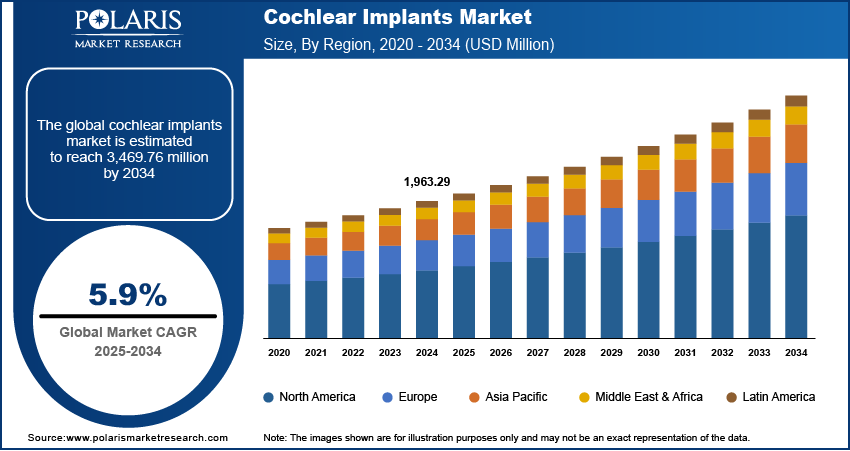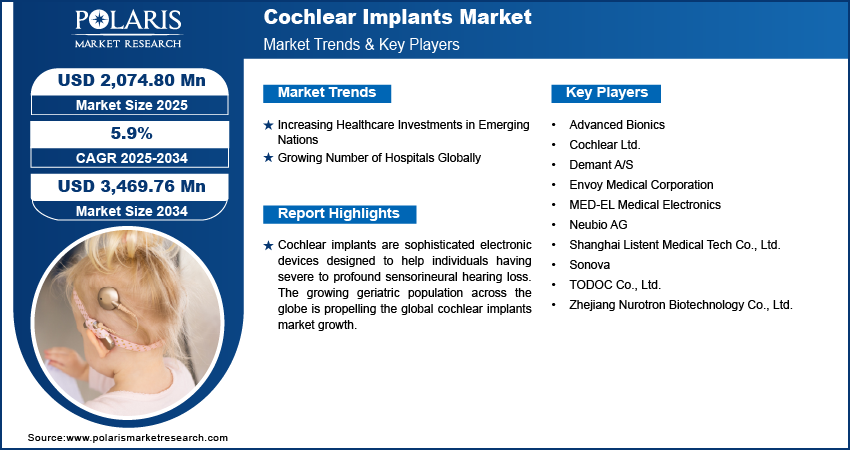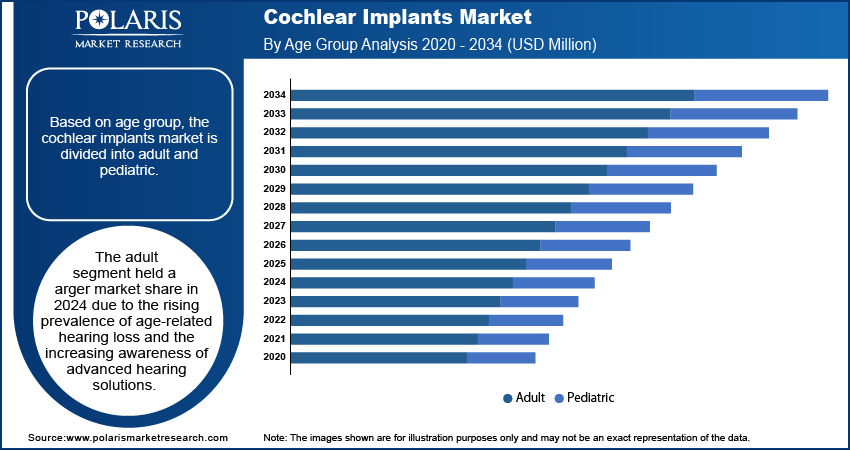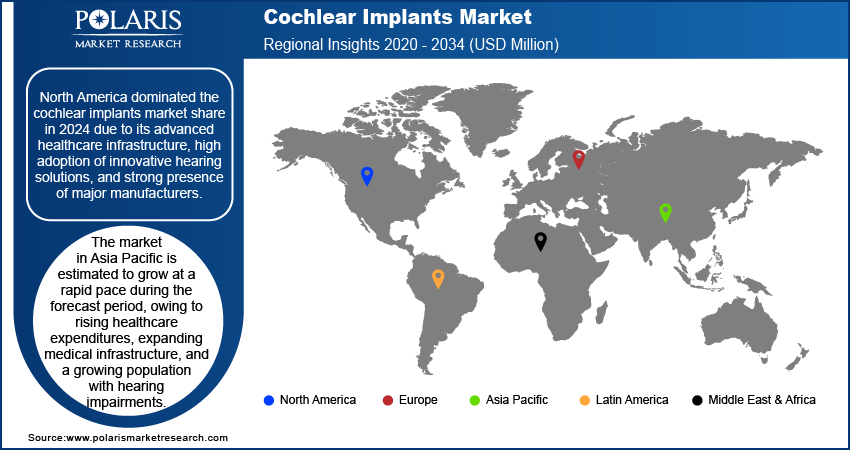
Cochlear Implants Market Size, Share, Trends, Industry Analysis Report: By Age Group (Adult and Pediatric), End User, and Region (North America, Europe, Asia Pacific, Latin America, and Middle East & Africa) – Market Forecast, 2025–2034
- Published Date:Apr-2025
- Pages: 129
- Format: PDF
- Report ID: PM5477
- Base Year: 2024
- Historical Data: 2020-2023
Cochlear Implants Market Overview
The global cochlear implants market size was valued at USD 1,963.29 million in 2024. The market is projected to grow from USD 2,074.80 million in 2025 to USD 3,469.76 million by 2034, exhibiting a CAGR of 5.9 % during 2025–2034.
Cochlear implants are sophisticated electronic devices designed to help individuals suffering from severe to profound sensorineural hearing loss. These implants bypass damaged parts of the inner ear by directly stimulating the auditory nerve with electrical signals. This allows users to perceive sounds and understand speech, which is particularly beneficial in both quiet and noisy environments. The implant consists of two main components: an external sound processor worn behind the ear, and an internal receiver-stimulator implanted under the skin. The external processor captures sound, processes it, and sends signals to the internal receiver, which then stimulates the auditory nerve. Cochlear implants are used by individuals who have significant permanent hearing loss and cannot benefit from traditional hearing aids. They are particularly effective for those with severe to profound hearing loss due to damage to the hair cells in the cochlea. The effectiveness of cochlear implants varies among users, influenced by factors such as age at implantation, parental involvement, and the overall health of the cochlear nerve.
The growing geriatric population across the globe is propelling the global cochlear implants market growth. United Nations published data stating that the global population aged 65 and above is projected to reach 2.2 billion by 2070, surpassing the number of children under age 18. Geriatric population usually witnesses deterioration in their hair cells in the inner ear, leading to sensorineural hearing loss. Cochlear implants offer a viable solution for these populations by providing them with the ability to perceive sounds and improve their quality of life. Governments and healthcare organizations are further recognizing the impact of age-related hearing loss and actively promoting solutions such as cochlear implants. Many insurance providers and national health programs are also offering coverage for implantation procedures, making them more accessible to seniors. Additionally, hospitals and clinics are conducting awareness campaigns to educate the geriatric population about cochlear implants for hearing restoration, leading to increased sales.

To Understand More About this Research: Request a Free Sample Report
The cochlear implants market demand is driven by the growing advancement in technology. These advancements enhance the functionality and performance of cochlear implants, making them more effective in restoring hearing. Improvements in sound processing algorithms and electrode design allow users to experience clearer and more natural sound, thereby enhancing their quality of life. This drives more individuals with severe hearing loss to opt for these devices. Advancements in medical imaging equipment and surgical techniques make the implantation process safer and more precise. Robotic-assisted surgeries and advanced imaging tools reduce risks and improve outcomes, encouraging more people to consider cochlear implants as a viable solution. Additionally, the integration of wireless connectivity and smart technology allows cochlear implants to sync with other devices, such as smartphones and televisions, offering greater convenience and accessibility, thereby boosting their adoption.
Cochlear Implants Market Dynamics
Increasing Healthcare Investments in Emerging Nations
Governments of various countries are investing heavily in their healthcare infrastructure. For instance, the share of Government Health Expenditure (GHE) in India’s GDP increased from 1.13% in 2014–15 to 1.84% in 2021–22. Increased healthcare spending allows emerging nations to upgrade their healthcare infrastructure and the training of healthcare professionals, making advanced medical technologies such as cochlear implants more accessible. Increased healthcare spending often includes public awareness campaigns that educate the population about hearing loss and the benefits of cochlear implants. These initiatives encourage individuals having severe hearing impairments to adopt cochlear implants. Additionally, financial support and subsidies for medical procedures make cochlear implants more affordable, enabling a larger segment of the population to access these life-changing devices. Therefore, increasing healthcare investments in emerging nations such as India and Brazil boost the cochlear implants market development.
Growing Number of Hospitals Globally
The rising number of hospitals globally is leading to increased access to specialized medical services, including audiology, ear, nose, and throat (ENT). As per the article published by Asian Medical Tourism, the number of hospitals in India has jumped from 43,500 in 2019 to 54,000 in 2024. This expansion allows a larger number of patients to receive diagnoses and treatment for hearing loss, driving the demand for cochlear implants. The establishment of new hospitals further comes with investments in advanced medical technologies and equipment, such as cochlear implants, to attract patients seeking the best treatment options for hearing impairments. Furthermore, the increasing number of hospitals drives competition and innovation in healthcare services. Hospitals focus on offering comprehensive care packages, including support services for cochlear implant recipients, such as rehabilitation and follow-up care. This holistic approach encourages more individuals to opt for cochlear implants, contributing to cochlear implants market expansion.

Cochlear Implants Market Segment Insights
Cochlear Implants Market Evaluation by Age Group
Based on age group, the cochlear implants market is divided into adult and pediatric. The adult segment held a larger cochlear implants market share in 2024 due to the rising prevalence of age-related hearing loss and the increasing awareness of advanced hearing solutions. Technological advancements, including improved speech processing algorithms and wireless connectivity, further encouraged more adults to opt for implantation, as these features significantly enhanced communication in their daily lives. Additionally, a higher disposable income among adults allowed for greater affordability of cochlear implants while expanding healthcare infrastructure ensured better access to specialized audiology centers for adults. The demand for cochlear implants further surged among adults as studies highlighted the cognitive benefits of early intervention, motivating older individuals to seek treatment before severe auditory decline their quality of life.
Cochlear Implants Market Assessment by End User
In terms of end user, the cochlear implants market is segregated into hospitals, ENT clinics, and others. The ENT clinics segment is expected to grow at a rapid pace in the coming years owing to their ability to provide quicker consultations and shorter waiting times compared to large hospitals, making them an attractive choice for patients requiring faster intervention. Many adults opt for treatment in ENT clinics due to the expertise of otolaryngologists who focus exclusively on auditory disorders, ensuring precise diagnosis and tailored treatment plans. The increasing affordability of outpatient procedures in these facilities further drives demand, as many patients prefer cost-effective solutions without compromising on quality. Insurance companies and government healthcare programs continue to expand coverage for clinic-based procedures, making treatment more accessible in ENT clinics. ENT clinics are estimated to become an increasingly preferred choice for cochlear implantation in coming years as technological advancements lead to less invasive surgical techniques.

Cochlear Implants Market Regional Analysis
By region, the report provides cochlear implants market insight into North America, Europe, Asia Pacific, Latin America, and the Middle East & Africa. North America dominated the cochlear implants market revenue share in 2024 due to its advanced healthcare infrastructure, high adoption of innovative hearing solutions, and strong presence of major manufacturers. The region witnessed a rise in implantation procedures as more individuals gained access to advanced treatment options through comprehensive insurance coverage and government-funded healthcare programs. The growing aging population, particularly in the US, contributed significantly to cochlear implant demand as age-related hearing loss became more prevalent in the aging population. According to the Population Reference Bureau, the number of Americans ages 65 and above is projected to increase from 58 million in 2022 to 82 million by 2050.
Widespread awareness campaigns and early screening initiatives in North America encouraged more adults to seek treatment, driving market growth in the region. The presence of well-established audiology centers, highly skilled medical professionals, and research facilities further strengthened the region’s dominance.
The Asia Pacific cochlear implants market is estimated to grow at a rapid pace during the forecast period, owing to rising healthcare expenditures, expanding medical infrastructure, and a growing population with hearing impairments. Countries such as China, India, and Japan are witnessing an increase in implantation procedures due to greater awareness and improved accessibility to specialized treatment centers. Government initiatives promoting early diagnosis and subsidized healthcare programs have made treatments more affordable, leading to a surge in demand for cochlear implants. The presence of a large patient pool, particularly among the aging population, further accelerates the cochlear implants market expansion in the region. India is expected to emerge as a key country in the market within the region due to its rapidly developing healthcare sector, increasing disposable income, and growing partnerships with global manufacturers.

Cochlear Implants Market Key Players & Competitive Analysis Report
Major players in the cochlear implants market are intensifying their focus on research and development to enhance product performance and meet evolving demands. To strengthen their market presence, these companies are adopting strategic initiatives, including innovative product launches, global partnerships, increased investments in production capabilities, and mergers and acquisitions. By leveraging these strategies, businesses are expanding their geographical reach and driving technological advancements, fostering industry growth and maintaining a competitive edge in the global market.
The cochlear implants market consists of numerous global and regional market players. A few major players in the market include Advanced Bionics; Cochlear Ltd.; Demant A/S; Envoy Medical Corporation; MED-EL Medical Electronics; Neubio AG; Shanghai Listent Medical Tech Co., Ltd.; Sonova; TODOC Co., Ltd.; and Zhejiang Nurotron Biotechnology Co., Ltd.
Cochlear Ltd is a major medical device company specializing in implantable hearing solutions, with a strong focus on cochlear implants. Founded in 1981, the company is headquartered in Sydney, Australia, and has grown to become a global company in its field. Cochlear's journey began with the remarkable work of Dr. Graeme Clark, who developed the first cochlear implant. The company holds approximately 50% of the global cochlear implants market as of recent data. Cochlear's product portfolio includes a range of innovative solutions designed to address various types of hearing loss. The company's flagship product is the Nucleus cochlear implant system, which is widely recognized for its effectiveness in restoring hearing to individuals with severe to profound sensorineural hearing loss. Cochlear further offers the Hybrid electro-acoustic implant and the Baha bone conduction implant, catering to different types of hearing impairments. These implants are complemented by a suite of wireless accessories, such as mini microphones and phone clips, enhancing the user experience. The company operates through several segments, including Cochlear Implants, Services, and Acoustics. The Cochlear Implants segment focuses on the development and marketing of cochlear implant systems. The Services segment provides sound processor upgrades, accessories, and other support services, while the Acoustics segment offers bone conduction systems and sound processor upgrades.
Envoy Medical Corporation is a hearing health company dedicated to developing innovative technologies for individuals affected by hearing loss. Headquartered in White Bear Lake, Minnesota, the company focuses on providing solutions across the hearing loss spectrum, including hearing aids, middle ear implants, and bone conduction devices. One of Envoy Medical's notable products is the Esteem fully implanted active middle ear implant (FI-AMEI). This device is designed for individuals suffering from sensorineural, conductive, or mixed hearing loss and offers the benefit of being fully implantable without external components. Users of the Esteem implant have reported significant improvements in their quality of life, citing the ability to hear naturally and continuously.
List of Key Companies in Cochlear Implants Market
- Advanced Bionics
- Cochlear Ltd.
- Demant A/S
- Envoy Medical Corporation
- MED-EL Medical Electronics
- Neubio AG
- Shanghai Listent Medical Tech Co., Ltd.
- Sonova
- TODOC Co., Ltd.
- Zhejiang Nurotron Biotechnology Co., Ltd.
Cochlear Implants Industry Developments
March 2024: MED-EL launched its latest cochlear implant innovations, which include four new devices and software supporting individualized hearing care.
November 2022: Cochlear Limited received US Food and Drug Administration (FDA) approval for the CochlearTM Nucleus 8 Sound Processor. The company claims that Nucleus 8 Sound Processor is the smallest and lightest behind-the-ear cochlear implant sound processor available in the market.
May 2020: HEARO, the world’s first image-guided robotic surgery platform for cochlear implants, received CE-Mark approval. The HEARO platform is a joint initiative between hearing implant manufacturer MED-EL and medical technology company CAScination AG.
Cochlear Implants Market Segmentation
By Age Group Outlook (Revenue, USD Million, 2020–2034)
- Adult
- Adult Unilateral Implants
- Adult Bilateral Implants
- Pediatric
- Pediatric Unilateral Implants
- Pediatric Bilateral Implants
By End User Outlook (Revenue, USD Million, 2020–2034)
- Hospitals
- ENT Clinics
- Others
By Regional Outlook (Revenue, USD Million, 2020–2034)
- North America
- US
- Canada
- Europe
- Germany
- France
- UK
- Italy
- Spain
- Netherlands
- Russia
- Rest of Europe
- Asia Pacific
- China
- Japan
- India
- Malaysia
- South Korea
- Indonesia
- Australia
- Vietnam
- Rest of Asia Pacific
- Middle East & Africa
- Saudi Arabia
- UAE
- Israel
- South Africa
- Rest of Middle East & Africa
- Latin America
- Mexico
- Brazil
- Argentina
- Rest of Latin America
Cochlear Implants Market Report Scope
|
Report Attributes |
Details |
|
Market Value in 2024 |
USD 1,963.29 Million |
|
Market Forecast in 2025 |
USD 2,074.80 Million |
|
Revenue Forecast in 2034 |
USD 3,469.76 Million |
|
CAGR |
5.9% from 2025 to 2034 |
|
Base Year |
2024 |
|
Historical Data |
2020–2023 |
|
Forecast Period |
2025–2034 |
|
Quantitative Units |
Revenue in USD Million and CAGR from 2025 to 2034 |
|
Report Coverage |
Revenue Forecast, Market Competitive Landscape, Growth Factors, and Trends |
|
Segments Covered |
|
|
Regional Scope |
|
|
Competitive Landscape |
|
|
Report Format |
|
|
Customization |
Report customization as per your requirements with respect to countries, regions, and segmentation. |
FAQ's
The global cochlear implants market size was valued at USD 1,963.29 million in 2024 and is projected to grow to USD 3,469.76 million by 2034.
The global market is projected to register a CAGR of 5.9 % during the forecast period.
North America had the largest share of the global market in 2024.
A few of the key players in the market are Advanced Bionics; Cochlear Ltd.; Demant A/S; Envoy Medical Corporation; MED-EL Medical Electronics; Neubio AG; Shanghai Listent Medical Tech Co., Ltd.; Sonova; TODOC Co., Ltd.; and Zhejiang Nurotron Biotechnology Co., Ltd.
The adult segment dominated the market share in 2024, due to the rising prevalence of age-related hearing loss and the increasing awareness of advanced hearing solutions.
The ENT clinics segment is expected to grow at the fastest pace in the coming years due to their ability to provide quicker consultations and shorter waiting times compared to large hospitals
